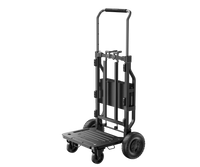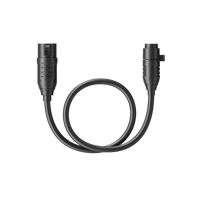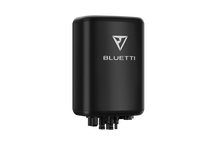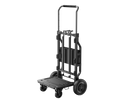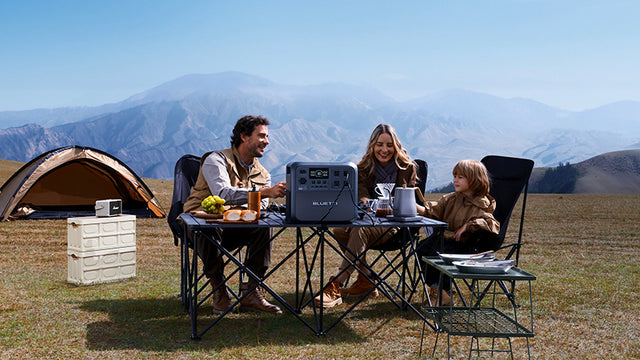Your cart is empty
Shop our products
The invention of portable solar panels has been a revolutionary development in the solar energy industry, providing adventurers, backpackers, and thrill-seekers with a mobile, green, and sustainable energy source for all their gadgets and appliances.
However, just like your standard rooftop solar system, setting up a portable solar panel system also requires one to take into account various factors, for instance, their energy requirements. Worried? Don’t be! This article will explain how to set up a portable solar panel system in just a few basic and easy-to-follow steps. So, without any further delay, let’s begin.
How to Set Up a Portable Solar Panel System
Calculate Your Energy Requirements
Regardless of whether you’re setting up a fixed roof-mounted solar system or a portable solar panel system, knowing your energy consumption is one of the rudimentary requirements of setting up the system. Why do you wonder?
This is because knowing your energy needs allows you to properly size your solar panel system and ensure that it has the right number of portable solar panels, the right sized battery, inverter, and charge controller all of which are key components of a solar panel system, portable or not. Setting up a system without considering your energy consumption could lead to you over or under-sizing the solar panel system.
This could mean that you would end up investing money in buying a system that produces more energy than you need. And since there is no net metering policy for portable solar panels, any surplus energy you produce would only go to waste. Or on the contrary, you could end up with a system that does not produce enough energy to satisfy all of your energy requirements.
Knowing this, we can see why it is important to factor in your energy requirements beforehand when setting up a portable solar panel system. However, since most people use portable solar panels for remote living, in an RV or an off-grid cabin maybe, they can’t rely on a monthly electric bill from a utility company to calculate their annual energy consumption as you would when designing a typical rooftop system.
Instead, you will have to do it manually by creating a list of all the electronics you want to power with your portable solar panel system. This can include devices such as fans, electric ovens, lights, smartphones, etc. Then, add the power (wattage) consumed by all the devices on your list. You can calculate the power, if not stated on the device, by multiplying the input current and voltage. Doing so will give you a good idea of how large of a portable system you need.
Select Your Solar Panels

There are a few things you must keep in mind when selecting portable solar panels for your system. The first and foremost is the wattage of the panels. Portable solar panels, like their regular, fixed alternative, come in various wattage options such as 120W, 200W, and 350W. You can determine what solar panel capacity would suit you the best by considering your net energy requirement which you should’ve already calculated by now.
For better understanding, suppose that your net energy requirement adds up to 180W. To fulfill your energy requirements, you could opt for a single 200W panel. The additional 20W would come in handy for compensating for the efficiency losses and any unforeseen variations in the amount of sunlight you receive. Furthermore, you should also factor in the amount of sunlight you’ll be receiving and the efficiency of the panels.
The more sunlight you get and the higher the efficiency of the panels, the less oversizing you have to do to compensate for losses. In short, if the efficiency of your panels is low and you also get relatively fewer hours of sun, you’ll probably do better with a system larger than 200W, say 240W (two 120W solar panels), to satisfy your 180W of energy requirement. The additional wattage will help accommodate the extra losses.
That is why, when selecting a solar panel for your portable system, go for a panel with high efficiency. Some companies such as Bluetti offer solar panels with efficiencies as high as 23.4% and therefore, would be a great place to buy your panels from.
Additionally, you should keep in mind that off-grid living can get a bit rough at times, and therefore, you should opt for solar panels that are also durable and robust. Make sure the panels you choose have some kind of scratch-resistant coating to protect the top glass layer and are also certified water or splash resistant, both of which are true for the panels offered by Bluetti.
Meeting all the above-mentioned requirements will get you a reliable and long-lasting system, capable of fulfilling all your energy needs.
Sizing the Battery

Solar batteries are essential for portable solar panel systems seeing as how solar panels are unable to produce any energy after sundown. With a battery, you can store the surplus energy produced by your system in the battery and use it to power your electronics at night and on cloudy days.
To determine the battery size that you’ll need for your system you first need to know how much energy you want to store in your battery. Continuing the example above and assuming you go for a 200W, 12V solar panel and that you receive 5 hours of peak sun where you’re staying, your system will be generating net energy of 1000Wh (watt-hour) or 1kWh per day.
Dividing energy by voltage of a panel gives us the current:
Strictly speaking, you need an 83.3Ah rated battery. However, it would be wise to factor in some buffer since there are losses within a battery as they are not 100% efficient, and also, batteries cannot discharge completely. Knowing this you should upsize your battery to perhaps 100Ah.
Furthermore, you should opt for a deep cycle battery for your portable system. This is because these batteries are designed for deeper discharges meaning you can draw more energy from them. Also, these batteries support rapid recharging and can sustain charging and recharging cycles day after day for much longer than your normal batteries.
Selecting a Charge Controller
The sole purpose of a battery charge controller is to regulate the flow of electricity from your portable solar panels to your solar battery. Its job is to keep the PV array's voltage and current in check so that the battery doesn't get overcharged or over-discharged. In doing so, charge controllers prevent excessive degrading of your solar battery and help extend its cycle life.
To calculate the size of a charge controller for your system, all you need to do is divide the net power produced by your portable solar panel(s) by the voltage of your battery. Doing so will give you the current rating for the charge controller you should get for your system. However, you should multiply the value by a safety factor to account for fluctuations in the power output of your panels. Just make sure that the voltage of your controller matches that of your solar battery.
If you’re using Lithium-ion (LiFePO4) batteries for your system, which is recommended, there are two primary charge controller types that you can get and these are the Pulse-Width Modulation (PWM) controller and the Maximum Power Point Tracking (MPPT) charge controller. MPPT controllers are generally more expensive than PWM controllers since, unlike PWM controllers, they also regulate the voltage coming from your panels making them more efficient.
The lower efficiency of PWM controllers makes them a poor choice for large solar panel systems, however, for small portable systems, they may be a viable option. Regardless, MPPT controllers remain the superior option in both cases.
Choosing an Inverter – Rectifying the Current
It is common knowledge that inverters are an integral component of all solar panel systems, portable or not. However, most people do not realize why inverters are so important. To put it shortly, inverters are required to convert the DC energy produced by your portable solar panels to AC energy. Generally, most appliances and electronics have been designed to operate on AC energy since that’s the energy we get from the grid.
As a result, these appliances cannot operate on the DC energy generated by your panels and will get instantly damaged if you try to power them directly. Hence, inverters are needed to convert the DC energy into usable AC energy.
The inverter's input rating should never be less than the total wattage of all the appliances you’ll be powering through your solar setup. Additionally, the nominal voltage of the inverter and the battery must be the same.
The inverter in your stand-alone portable solar panel system must be capable enough to handle the combined wattage of all the electronics you will be using at any given moment. In addition, you should also add a safety margin for any unexpected power surges, as is common with machines like pumps and fans, and therefore, should size your inverter 25% to 30% higher than the net wattage of all appliances you’ll be operating at any one time.
Sine wave inverters are generally recommended due to their higher efficiencies which can range from 90% to 95%.
Are our Portable Solar Panels Worth It?

Now that you know how to set up a portable solar panel system, the question that remains is whether or not it is even worth it investing in portable solar panels. Here are a few reasons to convince you why portable solar energy is a great investment:
Very Little Maintenance
A portable solar panel system has zero moving parts which mean that there is no need for lubrication or replacing moving parts such as bearings. A thorough wash and cleaning once every few months is all the maintenance the system requires. Compared to your typical gas generators, portable solar panel systems can save you quite a bit of money, time, and effort over the long run.
Can Be Easily Stored Away
Portable solar panels such as those offered by Bluetti carry a handy foldable design allowing you to fold your portable solar panels over on themselves and stow them away without sacrificing much space. This is something a generator cannot offer you. And if you go for a compact generator to save space, you’ll have to compromise on your energy requirements.
Can Produce Energy Practically Anywhere
The only thing solar panels require to produce energy is sunlight which is a sustainable and abundant resource and almost every place in the world has access to this resource. This means that you can generate energy with your solar panels almost anywhere in the world. With generators, however, your adventures can be limited by the availability of gasoline which isn’t as widespread or abundant as sunlight, especially in remote locations.
Frequently Asked Questions (FAQs)

What Do I Need for A Portable Solar System?
The four main components that you need for a portable solar panel system include:
- Portable solar panels
- A solar battery
- Inverter
- Charge controller
Do Portable Solar Panels Need to Be Grounded?
Yes, like any other electrical device, portable solar panels have to be grounded. Doing so ensures that any stray electrical charge in the body of the device is immediately dispensed into the ground and does not electrocute anyone who comes into contact with it.
Do You Need a Battery for Portable Solar Panels?
Although having a solar battery is not mandatory, it is a smarter choice to have one in your system. This is because solar panels cannot produce power at night, so having a battery storing energy in the daytime will allow you to power your appliances at night even when your solar panels are inactive.
Will a 100-Watt Solar Panel Run a Camper?
If your camping site receives long and continuous sun hours during the day and encounters no clouds in the sky, a 100-watt solar panel can generate a significant amount of electricity, which could be enough to power your RV. On a gloomy overcast day, however, a 100-watt solar panel's output is insignificant and will not be enough to power your RV.
Final Thoughts
Portable solar panels are a great way to power your RV or remote cabin and enjoy a completely off-grid life. One of the biggest plus points of portable solar systems is their low-maintenance nature and their ability to provide you with reliable energy output practically anywhere in the world. These benefits are something that other portable energy sources such as gas generators simply cannot match, let alone outperform. To ensure that you reap the full benefits of a portable solar panel system, make sure to buy your panels from a reputable and trusted brand such as Bluetti for a long-lasting and reliable system.
Shop products from this article
Be the First to Know
You May Also Like

What Does a 30% Federal Solar Tax Credit Mean and How to Apply?
Governments around the world are offering programs that encourage homeowners to switch to solar energy. Among the most notable programs is the 30% Federal Solar Tax Credit. It reduces your...

Deadly Flooding Devastates U.S. South and Midwest — What You Need to Know





































































